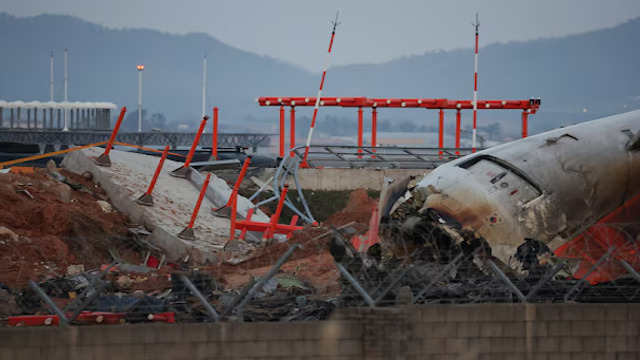
The remains of the Jeju Air plane, which skidded off the runway and crashed at Muan International Airport, are seen near a concrete structure it collided with in Muan, South Korea, on December 30, 2024. Reuters
On Thursday, South Korean police launched an investigation into Jeju Air and the operator of Muan International Airport after a tragic plane crash on Sunday that claimed the lives of 179 people. This marks the worst aviation disaster in South Korea’s history.
The ill-fated flight, Jeju Air 7C2216, took off from Bangkok, Thailand, heading to Muan, a regional airport in the southwest of South Korea. Upon arrival, the Boeing 737-800 attempted to land but ended up belly-landing on the runway. The plane slid off the runway and crashed into an embankment, bursting into flames. Tragically, the crash led to the loss of 179 lives, with only two crew members, who were seated in the rear of the aircraft, surviving. Rescuers pulled the crew members from the wreckage, but they were injured.
In response to the disaster, police have raided several locations, including the office of Jeju Air in Seoul, the Muan airport operator’s offices, and the regional transportation ministry’s aviation authority. Authorities are searching for documents and materials related to the aircraft’s maintenance and the airport’s operations. The investigation aims to uncover what led to the devastating incident.
The investigation is also supported by South Korean officials, along with the U.S. National Transportation Safety Board (NTSB), the Federal Aviation Administration (FAA), and Boeing. There are still many questions surrounding the crash, including why the plane did not deploy its landing gear and why the pilot chose to attempt a second landing after declaring an emergency and reporting a bird strike. One of the main areas of focus is the embankment near the runway, which may have contributed to the severity of the crash. Air safety experts have raised concerns about the rigid structure, saying it was too close to the end of the runway and posed a significant danger when the plane made impact.
As the investigation unfolds, officials are working to analyze data from the plane’s flight data recorder, which sustained some damage during the crash. The data will be sent to the U.S. for analysis, and the cockpit voice recorder’s audio files are expected to provide critical insights into the final moments of the flight.
The South Korean Ministry of Transportation has already stated that a special inspection of all Boeing 737-800 aircraft in the country will be conducted. If any issues are found, immediate action will be taken. The Ministry also emphasized the importance of inspecting maintenance procedures, training, and operational practices for all aircraft of the same model.
In the aftermath of the crash, President Choi Sang-mok has pledged to support the families of the victims as they receive their loved ones’ remains. He also condemned the spread of malicious posts and fake news on social media regarding the disaster, urging authorities to take action against those responsible.
As the investigation continues, the focus remains on uncovering the causes of this tragic accident and preventing similar incidents in the future.















